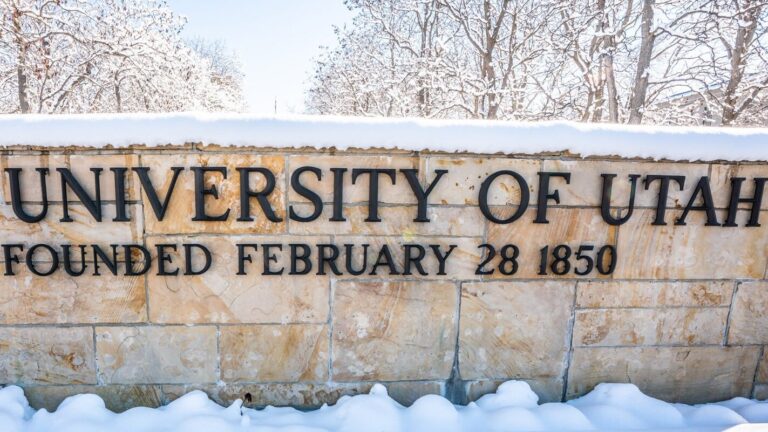USHE Reciprocity For Transfer Students
These are the requirements and deadlines for students who transferred from another USHE school with residency previously to the U.
The requirements for each policy are listed, and the student must meet ALL requirements. In all cases, the Residency Division of the University of Utah Admissions Department is the determining body for all residency exceptions.
Follow all the steps in “Steps to Apply” found below.
USHE Transfer Student Residency Reciprocity is for:
Students who have attended and received residency at other institutions in the USHE system who want resident student status at the University of Utah.
Other types of Residency exceptions:
- Military or veteran exceptions
- Olympic exceptions
- American Indian student exceptions
- State or Federal exceptions
- House Bill 118
- House Bill 144
Please note that retroactive residency for past semesters is not granted,
“R512-5.2.1 Application Deadline: Students must meet institutional application deadlines for each term…institutions may not accept applications for resident student status or supporting documentation after the third week of the semester or term for which the student seeks resident student status.”
Steps to Apply
-
Step 1: Read
Utah state law (USHE R512, Resident Student Status 5.2.3) says:
“The burden is on the student to prove that they are eligible for [residency]…“,
…and as such, we expect all students to learn about their options, and make choices based on that learning. Please learn your obligations regarding residency:
- Please read the “Mandatory Reading” to learn about the legal rules regarding residency in Utah.
- Please read through the different residency options, including:
- Reclassification policies for Undergraduate or Graduate students
- Military Exceptions
- American Indian Exceptions
- Olympics Exceptions
- Transfer Students from other Utah schools
- State and Federal Exceptions
- Tuition Waivers
-
Step 2: Apply
- Apply for the semester you want to become a resident student as soon as you can, starting on the Applications Open date, found here.
- Work on your residency reclassification only begins with an application, so submit one as soon as possible.
- Applications received* by or before the All Application Deadlines listed here, and are later on completed, will be guaranteed a decision by the first day of the semester.
- You don’t need to have all the required documents at the time you apply. You can submit those documents once you have them ready, up until the Census Deadline.
*Please note: Successful submission of the reclassification application will return you to the Main Residency webpage. Once your application has loaded into our system, you will receive a confirmation email with additional instructions. Please allow up to two business days for this process to occur.
- If you do not receive a confirmation email after 2 business days, please try to submit an application again, or contact the Residency Division for confirmation.
- DO NOT USE A MOBILE DEVICE to submit an application.
- Please only use a supported internet browser listed here
- Apply for the semester you want to become a resident student as soon as you can, starting on the Applications Open date, found here.
-
Step 3: Submit Required Documents
Once your application is submitted, submit all the required documents that your application needs. You can do this with the link below, the Document Submission Form.
The policy criteria are explained in the "Transfer Student from a USHE School Residency Reciprocity Policy" section below.
You can send those in as soon as you have them ready, up until the last day to work on applications, Census Deadline.
CLICK HERE – DOCUMENT SUBMISSION
YOU MUST COMPLETE ALL THE CRITERIA, INCLUDING ALL REQUIRED DOCUMENTATION.
-
Step 4: Follow Up
The Residency evaluator working on your application will be emailing you about additional steps needed, such as to remind you of what documents are still needed.
Check your UMail account often to find out what your application status is.
If you’re not receiving Residency emails, contact us to update your email addresses for Residency communications.
Visit us:
Student Services Building,
201 S 1460 E,
Salt Lake City, UT 84112Office Hours (All times are Mountain Time Zone):
Monday through Friday – 8:00 A.M. to 5:00 P.M.
Closed Tuesday from 8:00 A.M. to 10:00 A.M. for Staff MeetingsCall us: 801-581-8761, Option 5
Email us: residency@utah.edu



Transfer Student from a USHE School Residency Reciprocity Policy
Student Who Has Attended Another Utah School (in the Utah System of Higher Education/USHE System) Within the Past Year Classified as a Utah Resident for Tuition Purposes:
The following criteria is required:
- Residency Exceptions Certification Form application
- Letter sent directly from another Utah institution verifying resident status and dates of enrollment.
- ONE of the following Utah Domiciliary Ties (see tie deadlines here)
- Valid Utah driver’s license
- Valid proof of active Utah voter registration via their voter registration card or a certified letter from the County Clerk’s office.
- Valid Utah vehicle registration, if the student has a vehicle in their name
*Additional ties may be required if the required domiciliary ties are established late, or if they are unavailable due to other circumstances
Residency for Tuition Purposes Calendar
-
Summer 2025
All Summer 2025 Residency Applications are open from January 15, 2025 to tuition deadline May 21, 2025.
APRIL 1, 2025 IS THE SUBMISSION DEADLINE TO GUARANTEE A DECISION BY THE FIRST DAY OF SEMESTER.
Applications close after May 21, 2025 tuition deadline.
- Please submit your residency application by April 1, 2025.
- Applications submitted by the April 1, 2025 deadline, that are complete at that time or completed shortly thereafter, are guaranteed to receive a decision by the first day of the semester.
- A completed application is an application that has all the required documentation submitted
- The last day to submit the application is tuition deadline.
- Applications submitted by the April 1, 2025 deadline, that are complete at that time or completed shortly thereafter, are guaranteed to receive a decision by the first day of the semester.
- Submit all required documents as soon as possible, no later than census deadline June 2, 2025.
- You can continue to submit additional required documentation with the Document Submission Form here until the census deadline June 2, 2025.
- No documents will be received, and incomplete applications will be removed, after census deadline.
- Please Note: Applications submitted between April 2, 2025 to May 21, 2025 are late. We will work on these applications until the census deadline; we cannot guarantee a decision by the first day of the semester.
- Incomplete applications are removed after the census deadline.
- Please submit your residency application by April 1, 2025.
-
Fall 2025
All Fall 2025 Residency Applications are open from January 15, 2025 to tuition deadline August 29, 2025.
JULY 1, 2025 IS THE SUBMISSION DEADLINE TO GUARANTEE A DECISION BY THE FIRST DAY OF SEMESTER.
Applications close after August 29, 2025 tuition deadline.
- Please submit your residency application by July 1, 2025.
- Applications submitted by the July 1, 2025 deadline, that are complete at that time or completed shortly thereafter, are guaranteed to receive a decision by the first day of the semester.
- A completed application is an application that has all the required documentation submitted
- The last day to submit the application is tuition deadline.
- Applications submitted by the July 1, 2025 deadline, that are complete at that time or completed shortly thereafter, are guaranteed to receive a decision by the first day of the semester.
- Submit all required documents as soon as possible, no later than census deadline September 8, 2025.
- You can continue to submit additional required documentation with the Document Submission Form here until the census deadline September 8, 2025.
- No documents will be received, and incomplete applications will be removed, after census deadline.
- Please Note: Applications submitted between July 2, 2025 to August 29, 2025 are late. We will work on these applications until the census deadline; we cannot guarantee a decision by the first day of the semester.
- Incomplete applications are removed after the census deadline.
- Please submit your residency application by July 1, 2025.
-
Spring 2026
All Spring 2026 Residency Applications are open from September 15, 2025 to tuition deadline January 16, 2026.
NOVEMBER 1, 2025 IS THE SUBMISSION DEADLINE TO GUARANTEE A DECISION BY THE FIRST DAY OF SEMESTER.
Applications close after January 16, 2026 tuition deadline.
- Please submit your residency application by November 1, 2025.
- Applications submitted by the November 1, 2025 deadline, that are complete at that time or completed shortly thereafter, are guaranteed to receive a decision by the first day of the semester.
- A completed application is an application that has all the required documentation submitted
- The last day to submit the application is tuition deadline.
- Applications submitted by the November 1, 2025 deadline, that are complete at that time or completed shortly thereafter, are guaranteed to receive a decision by the first day of the semester.
- Submit all required documents as soon as possible, no later than census deadline January 26, 2026.
- You can continue to submit additional required documentation with the Document Submission Form here until the census deadline January 26, 2026.
- No documents will be received, and incomplete applications will be removed, after census deadline.
- Please Note: Applications submitted between November 2, 2025 to January 16, 2026 are late. We will work on these applications until the census deadline; we cannot guarantee a decision by the first day of the semester.
- Incomplete applications are removed after the census deadline.
- Please submit your residency application by November 1, 2025.
-
Summer 2026
All Summer 2026 Residency Applications are open from January 15, 2026 to tuition deadline May 20, 2026.
APRIL 1, 2026 IS THE SUBMISSION DEADLINE TO GUARANTEE A DECISION BY THE FIRST DAY OF SEMESTER.
Applications close after May 20, 2026 tuition deadline.
- Please submit your residency application by April 1, 2026.
- Completed applications submitted by the April 1, 2026 deadline are guaranteed to receive a decision by the first day of the semester.
- A completed application is an application that has all the required documentation submitted
- The last day to submit the application is tuition deadline.
- Completed applications submitted by the April 1, 2026 deadline are guaranteed to receive a decision by the first day of the semester.
- Submit all required documents as soon as possible, no later than census deadline June 1, 2026.
- You can continue to submit additional required documentation with the Document Submission Form here until the census deadline June 1, 2026.
- No documents will be received, and incomplete applications will be removed, after census deadline.
- Please Note: Applications submitted between April 2, 2026 to May 20, 2026 are late. We will work on these applications until the census deadline; we cannot guarantee a decision by the first day of the semester.
- Incomplete applications are removed after the census deadline.
- Please submit your residency application by April 1, 2026.
-
Starting Summer Semester 2024 onward, all Exception and Addendum applications for Residency (Military/Veteran, American Indian, Olympic Athlete, USHE Transfer Student, and State of Utah Exceptions, Addendum) will have the same deadlines as all Residency Reclassification applications for the following dates:
- Application Open
- Domiciliary Tie Establishment Deadline
- On-Time Application Deadline
- Application Closes
- Document Submission Deadline
- Incomplete Applications Removed
-
Late Application Submissions
An application is considered late if it is submitted after the deadline (see “Residency for Tuition Purposes Calendar” above).
The hard late deadline for application submission is the tuition deadline. No application will be accepted after the tuition deadline for the requested term of reclassification.
Late Documentation
Required documentation (proof of physical presence documents, submission of Utah ties, proof of tax independence documents, etc.) will be accepted through the census deadline of the requested term of reclassification at the latest. Documentation should be submitted as soon as possible prior to this deadline. No documentation will be accepted after the census deadline for the requested term of reclassification.
Students submitting documentation must have a residency reclassification application on file that was submitted by the hard application deadline.
-
Some students may qualify to have their nonresident tuition portion waived through nonresident tuition waivers House Bill 144 or House Bill 118.
Information on House Bill 144 & House Bill 118 tuition waivers, as well as the application, are available here.
Have Questions?
-
Visit us at:
Student Services Building,
201 S 1460 E, Salt Lake City, UT 84112Office Hours (All times are Mountain Time Zone):
- Monday – 8:00 A.M. to 5:00 P.M.
- Tuesday – 10:00 A.M. to 5:00 P.M. (Staff Meetings every Tuesday morning 8:00 to 10:00 A.M.)
- Wednesday – 8:00 A.M. to 5:00 P.M.
- Thursday – 8:00 A.M. to 5:00 P.M.
- Friday – 8:00 A.M. to 5:00 P.M.
-
Call us:
801-581-8761, Option 5 to speak with a Residency staff member
-
Email us:
-
Join a Zoom Q&A:

